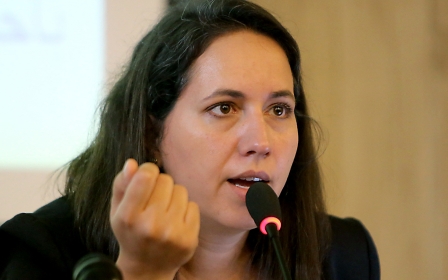India: Modi accused of 'treason' as Pegasus spyware sale linked to $2bn arms deal with Israel

A new report alleging that the purchase of Israeli spyware Pegasus was at the centre of a $2bn weapons deal signed between India and Israel in 2017 has sparked outrage among Indian opposition groups and civil society.
On Friday, the New York Times published an in-depth investigation detailing how Israel allegedly used the NSO Group’s spyware as a core part of its diplomacy around the world.
'This is treason. Modi Govt has committed treason'
- Rahul Gandhi
It claimed that the sale of Pegasus, along with a missile system, were “the centrepieces” of the sale of $2bn worth of weapons and intelligence gear agreed in April 2017 by Indian Prime Minister Narendra Modi and his then Israeli counterpart Benjamin Netanyahu.
Three months after the deal was signed, Modi became the first Indian premier to visit Israel, while Netanyahu made a rare return visit months later.
The right-wing Hindu nationalist leader is noted for his close relationship with Israel, and in 2019 his government voted against giving Palestinian human rights organisations observer status at United Nations institutions.
In July, an investigation by Indian publisher The Wire revealed that over 300 Indian mobile numbers, including those belonging to opposition leaders, activists, government officials and ministers, scientists and legal professionals, were among a leaked global database of likely targets for surveillance using Pegasus.
At the time, Information Minister Ashwini Vaishnaw branded the accusations a “sensational” attempt to “malign Indian democracy”, and denied that the government had any transactions with NSO Group.
India's Supreme Court set up an expert panel in October to look into the allegations of unauthorised surveillance using Pegasus, after the government failed to respond to its questions, citing national security.
'This is treason'
The latest allegations have sparked strong reactions from opposition figures and civil society groups.
“Modi Govt bought Pegasus to spy on our primary democratic institutions, politicians and public. Govt functionaries, opposition leaders, armed forces, judiciary all were targeted by these phone tappings,” Rahul Gandhi, an influential member of parliament hailing from the prominent Nehru-Gandhi family, tweeted on Saturday.
“This is treason. Modi Govt has committed treason,” he added.
Subramanian Swamy, an MP and former cabinet minister, said the revelations implied that the Indian government “misled [the] Supreme Court and Parliament”, comparing it to the Watergate scandal.
The Editors Guild of India published a statement expressing “deep concern” about the report.
“The claims in the NYT are in stark contrast to the stance of the government of India, which has been and continues to be vague and noncommittal in its response to these extremely serious allegations,” it said on Sunday.
Opposition parties have sought an urgent privilege motion against Vaishnaw, alleging that the information minister deliberately misled parliament by stating that the government had never purchased Pegasus.
On Saturday, activists from India’s Youth Congress held a protest in New Delhi over the allegations, amid a heavy police presence. Activists wore Modi masks, held banners and pretended to be listening to conversations using prop telephones.
Videos shared on social media showed authorities manhandling and arresting several demonstrators.
Middle East Eye propose une couverture et une analyse indépendantes et incomparables du Moyen-Orient, de l’Afrique du Nord et d’autres régions du monde. Pour en savoir plus sur la reprise de ce contenu et les frais qui s’appliquent, veuillez remplir ce formulaire [en anglais]. Pour en savoir plus sur MEE, cliquez ici [en anglais].




